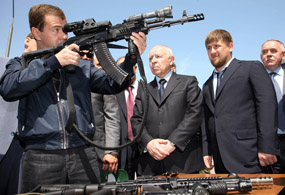
Deputy Chairperson of Ingushetia’s Supreme Court Murdered
Publication: Eurasia Daily Monitor Volume: 6 Issue: 111

President Dmitry Medvedev traveled to Dagestan on June 9 and vowed to fight extremism in the North Caucasus just four days after the assassination of the republic’s interior minister, Adilgerei Magomedtagirov, at a wedding ceremony in the capital Makhachkala (EDM, June 9). However, attacks apparently carried out by rebels continued unabated across the region.
On June 10, the deputy chairperson of Ingushetia’s Supreme Court, Aza Gazgereyeva, was shot to death in the center of Nazran while she was driving to work. Another five people in the car in which she was traveling were hospitalized with gunshot wounds.
The chairman of the republic’s Supreme Court, Mikhail Zadvornov, said after Gazgereyeva’s murder that while she had not been directly involved in prosecuting members of "illegal armed formations," she had considered appeals involving convictions of rebels and had taken a number of procedural decisions in cases involving members of the armed underground.
Late on June 9, unidentified attackers fired an automatic weapon at an OMON special tasks police officer in the village of Tyube, located in Kirovsky district of Makhachkala, Dagestan’s capital. The policeman, who was returning home from work, was killed. Less than two hours later, a traffic policeman was killed near the village of Karl Marx in Dagestan’s Kizlyar district when his patrol unit stopped a VAZ-2109 car for a document check and someone inside opened fire with an automatic weapon (Interfax, June 9).
Also on June 9, armed gunmen attacked the police headquarters in the village of Karabudakhkent in Dagestan’s Karabutdakhkentsky district. Interfax quoted a police source as saying that about 10 gunmen took part in the attack, using machineguns and automatic rifles and firing from three different directions. Additional policeman and OMON personnel from a neighboring village came to the aid of the besieged policemen and the attackers were beaten back. Armored personnel carriers and other special vehicles were then sent into the area to search for the attackers. None of the policemen were hurt, and it was not clear whether there were casualties among the attackers (Interfax, RIA Novosti, June 9).
Around the same time as the attack on the police headquarters in Karabudakhkent, another group of militants attacked a police station in the village of Karamakhi in Dagestan’s Buinaksk district. According to media reports, police also beat back that attack (www.newsru.com, July 10).
During his visit to Dagestan on July 9, President Medvedev convened a meeting of the Kremlin’s Security Council in Makhachkala and told those in attendance, including Russian Interior Minister Rashid Nurgaliev and Federal Security Service Director Aleksandr Bortnikov, that the assassination of Dagestani Interior Minister Adilgerei Magomedtagirov was a "cynical challenge" to the authorities and the state and that law enforcement must quickly track down Magomedtagirov’s killers. "This extremism is being delivered from abroad when riff-raff of all kinds is coming to foul on our land," Medvedev said, in comments broadcast on all of Russia’s main television channels. "The work to restore order and to wipe out terrorists must be continued. Security in the North Caucasus and the life and health of our people are at stake." State television also showed Medvedev observing Special Forces training and inspecting an array of weaponry (Reuters, AFP, RIA Novosti, June 9; Vremya Novostei, June 10).
However, Medvedev also said that local problems in the North Caucasus, including "such contradictions as clans, thievery, bribes," and "systemic deformations in state management," are breeding violence and insecurity in the region (AFP, June 9).
In a similar vein, the Memorial human rights group said in a statement following Magomedtagirov’s assassination that while the armed Islamist underground in Dagestan presents a serious threat that must be countered, "the clan way of life" and the fight for influence between different groups in the republic represent an even greater threat.
Memorial stated that "whoever killed the head of the [Dagestani] MVD – the irreconcilable opponents of Russian statehood or those who belong to power bodies of that state and hope to rule Dagestan tomorrow," the assassination shows that the situation in the republic has become unacceptable. The human rights group noted that, on the one hand, the armed underground has carried out a relentless wave of attacks on senior law enforcement and security officials in the republic over the last several years, while, on the other hand, there has been a bloody struggle between "ethnic-based criminal groups" for power and influence in the republic featuring contract killings and attacks on politicians and officials.
"The clans penetrate the power structures, law enforcement bodies and business from top to bottom," Memorial said in its statement on Dagestan in the wake of the Magomedtagirov assassination. "A person’s position in society is largely determined by his proximity to the leadership of one or another clan. This system is engendering corruption unprecedented even for the North Caucasus. It leaves many citizens of the republic without hope for a worthy life and sows interethnic discord in a multiethnic republic. Political murders are an inevitable consequence of such a state of affairs" (Kavkazky Uzel, June 9).
According to the newspaper Vremya Novostei, local observers believe the assassination of the Dagestani interior minister was not the work of Islamist militants but rather the work of someone seeking to weaken the position of the republic’s current president, Mukhu Aliev (Vremya Novostei, June 10).




